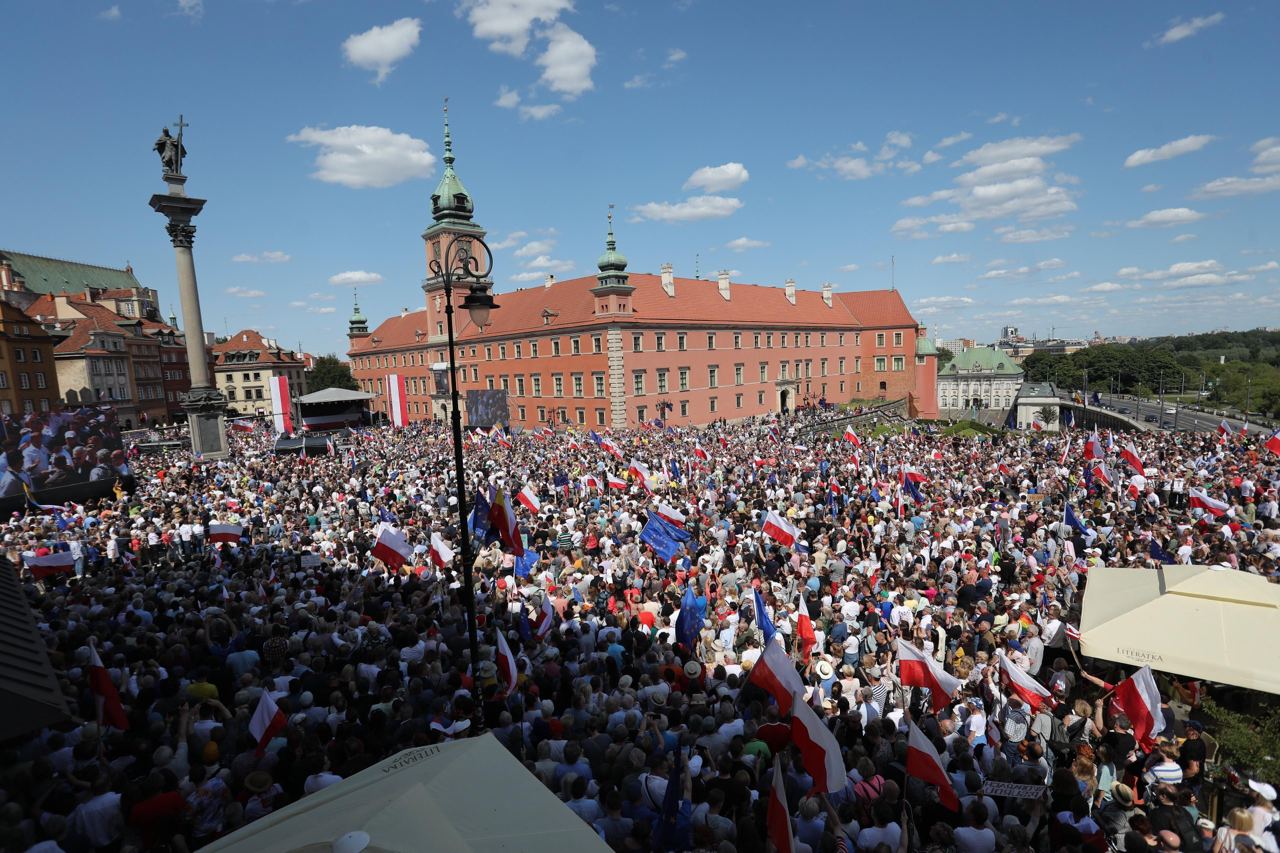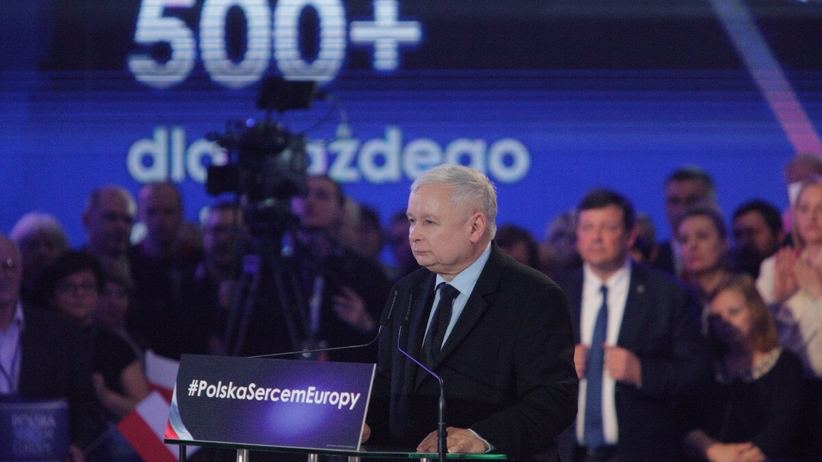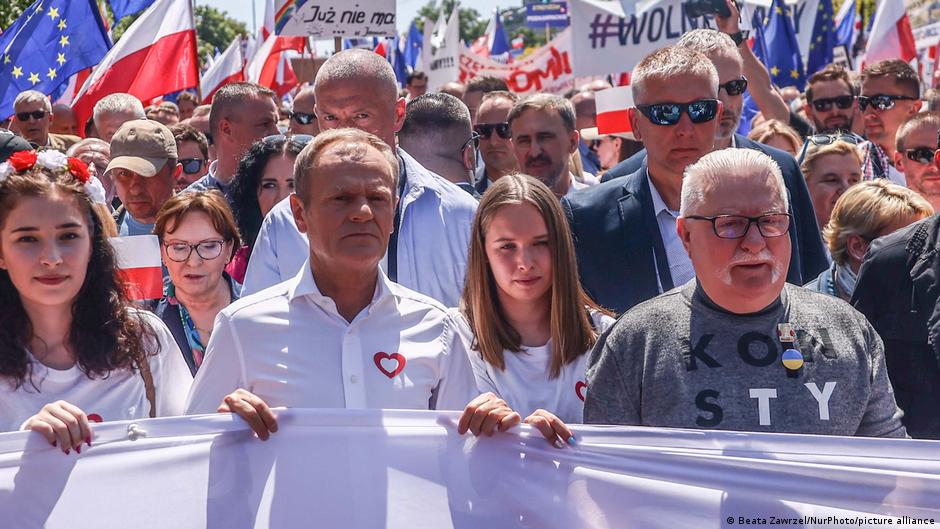I wonder which Russian-speaking readers remember what happened in Poland on June 4, 1989? And many Poles have already forgotten that on that day 34 years ago, the Communist Party crushedly lost the parliamentary elections, and this marked the end of the regime. Poland was the first of the countries of the former socialist camp, a few months before the fall of the Berlin Wall, managed to defeat the old system. It’s even a little insulting that outside the country they do not fully recognize its historical role in the fight against communism, or rather, the role of the Solidarity trade union, Lech Walesa and John Paul II.

Most likely, in 2023, the date of June 4 for holding a major opposition rally was not chosen by chance. For many participants in the thousands of protests, this anniversary has an important symbolic meaning. Especially for the older generation, who remembers the old days well. Almost forty years ago, freedom and democracy won in the country, and now many believe that it is necessary to once again enter into a struggle with a regime that does not respect the values that seemed then to be established forever.
Almost forty years ago, freedom and democracy won in the country, and now we must again fight the regime
PiS and propaganda
For almost eight years now, Poland has been ruled by the nationalist Law and Justice Party, headed by Jarosław Kaczynski, brother of President Lech Kaczynski, who died in the Smolensk plane crash. Representatives of this party managed to win the parliamentary elections twice: in 2015 and 2019. Andrzej Duda, a candidate nominated by the same political force, was twice elected president of the country. Most of the population liked the program proposed by Kaczynski's supporters, in which he said: enough rotten European liberalism, it's time to return to traditional family values, it is necessary to strengthen the country's sovereignty, fight the dictates of Brussels, which is mainly under the influence of Berlin.
PiS offered its own version of history, in which there was only room for patriotic heroism. Any attempts in this area, aimed at finding the truth, only provoked media hysteria, for example, accusations against Poles who extradited Jews to the Germans began to be considered a provocation, and Polish anti-Semitism was considered “an invention of the enemies.”
But it would be impossible to win two elections with one patriotic-historical-Catholic narrative. The second part of the program proposed by Kaczynski's party was of a social nature. The rigid financial policy of the predecessors created the conditions in which it was possible to make a number of generous social payments to sections of the population, whose loyalty it would help to enlist at various levels of elections. And it worked.
The PiS flagship was the 500+ program: regardless of the level of family income, all citizens with children under 18 began to receive a monthly allowance of 500 zlotys (approximately 120 euros). Millions of voters liked it. Of course, pensioners have not been forgotten – Poland is aging, their number is constantly growing. Annually pensions rise in accordance with inflation and the size of the average wage. But the government has come up with an even more generous gift for this category of voters. A special law was passed in Parliament, and now every pensioner receives an additional two pensions – in the spring and at the end of the year – which are not taxed.

Ask what is wrong with such a government that implements generous social programs and sings of the heroism of its people? The trouble is that at the same time this government is strangling freedom of speech, breaking down the independent law enforcement system, paralyzing the work of the Constitutional Court, adopting the toughest abortion law in Europe, and launching a state propaganda machine based on the Putin model. Under the guise of faith and patriotism, PiS supporters receive a lot of money, they have monopolized the personnel policy regarding fabulously profitable high positions in state corporations such as the oil concern Orlen. State subsidies flow like a river to where "their" people are sitting, observing party discipline. All sorts of patriotic NGOs, charitable foundations created with the participation of the Catholic Church, cultural figures who are ready to sing of the country's traditional values and heroic past can count on generous financial support. Kaczynski and his associates really want to build a model of government, which was implemented with such success by the Hungarian leader Orban and Turkish President Erdogan. Courts are on the phone, independent media are muzzled, Parliament is no place for discussion, loyal historians are rewriting history. Do you want to live well? Don't stick out.
State subsidies flow like a river to where their people sit
On the other hand, there is a catastrophic lack of money for the healthcare system, people have been waiting for years to see specialists, and the prices of medical services offered in the private sector are growing rapidly every year. Things are no better in the education system: teachers and scientists complain about the level of salaries, there is not enough money to implement many scientific research projects. Several times during the rule of Kaczynski's party, protests were raised by people with disabilities, demanding more care from the state. But voters with disabilities are few and far between, their votes are not as important as those of pensioners, so the government could ignore their needs for years.
PiS does not hear any criticism: “We know better. Those who are not with us are enemies." The party primarily accuses its opponents of working for Moscow or Berlin, and that they are indifferent to the well-being of the population. It is enough to turn on the first channel of the state Polish television. A viewer familiar with the propaganda technology of Russian state channels might be surprised to find that some Polish colleagues of Russian TV presenters do their jobs just as well as they do.
Fortunately, there is still opposition television in Poland. PiS's attempt to nationalize the opposition channel TVN, which is owned by US shareholders, failed miserably. Close allied relations with the United States proved to be an insurmountable obstacle. The print and electronic media have also retained some corridor of freedom, such as the daily Gazeta Wyborcza, whose editor-in-chief since its inception has been the legendary communist-era dissident Adam Michnik.
What was wrong with the PiS party
Let's look at the example of the Warsaw rally of many thousands on June 4th. “500,000 protesters is a lie, there were no more than 100,000,” state television says. “Yes, the weather was good, someone came to Warsaw to go to the zoo with their children, eat ice cream, see the sights. And how aggressively and boorishly the protesters behaved, how much rubbish they left…” From commentators – supporters of the ruling party, the viewer of the first channel will hear that the opposition has no program, that its leaders only think about their earnings, that their victory in the upcoming elections will mean a catastrophe of historical proportions for the country. It is not a pity to spend money on propaganda, state television receives multimillion-dollar subsidies from the budget every year, although the main sources of its funding should be the subscription fee paid by the viewer and advertising revenue.
In the period from 2015 to 2020, the economy was on the rise, unemployment fell sharply, people experienced a real increase in income, so PiS propaganda worked effectively. The construction of modern roads funded with European money continued in the country, the modernization of airports, exports increased, foreign companies willingly invested in industry. Poland, despite the mistakes and failures of the government in the field of economy, such as non-compliance with budgetary discipline, is still an example of real success among post-communist countries.
However, since 2020, clouds have begun to gather over Poland, which it is no longer possible to cover up with propaganda measures alone. The underfunded health care system hasn't quite dealt effectively with the coronavirus pandemic. Excessive spending of budget money, together with the categorical refusal of the Polish authorities to accept the euro currency, became a catalyst for inflation that broke out due to Russian aggression in Ukraine. Prices rose by almost 20%, followed by an increase in the interest rate of the National Bank, which led to an increase in the rate on mortgage loans. The authorities began to call inflation "putinflation", thus emphasizing that it is a direct consequence of Russia's attack on Ukraine, which led to a jump in gas and oil prices in European markets. But this did not help to cope with the discontent of the population. The ongoing conflict with the European Commission also works against PiS. In response to a reform of the judiciary, which, according to the Polish opposition and Brussels, violates the independence of Poland, the European Commission has slowed down the multibillion-dollar payments provided for by the European recovery plan adopted after the pandemic. Without these funds, the continuation of all PiS social projects may be in doubt.
The authorities began to call inflation "putinflation", but this did not help to cope with the discontent of the population
Jarosław Kaczynski's party also faced issues of state security. The government has significantly increased defense spending, adopted a program to increase the size of the armed forces. However, a number of recent events have raised doubts about the competence of the people at the head of the law enforcement agencies. For the past few weeks, the Minister of Defense and the commanders of the armed forces have been arguing over who missed a Russian missile that fell in a Polish forest near the city of Bydgoszcz last December.
Coronavirus, war, influx of Ukrainian refugees, inflation, Europe's toughest abortion law – all this could sink any government. In the history of Poland over the past thirty years, there have been cases when a party that has been in power for four years and pursued a course of reforms did not enter the parliament at all in the next elections, or could gather only an insignificant faction in the new Sejm. The political price that had to be paid for power and liberal reforms could be very high. However, it seems that this is not the case of PiS, for whose electorate the punctures in the economy are not as significant as the white and red patriotic suit of the defender of national traditional values. PiS activists use a rhetoric full of words such as "patriotism", "sovereignty", "Catholic faith", "church", "tradition", "values", "bonds". Supporters of the party in its nationalist incarnation will not allow people of a different political orientation, open to liberal reforms and ready to pass laws protecting sexual minorities, to return to power. The conservative part of Poland is afraid of changes and slogans coming from the West.
The conservative part of Poland is afraid of changes and slogans coming from the West
Polish opposition
However, PiS does not yet have a monopoly on power. Poland is divided, for several years now it has been living in a cold civil war. The ruling party has a lot of opponents. Young people, intellectuals, residents of big cities want to continue the course of European modernization and integration, they are also patriots, but they see the future differently than their conservative compatriots.
Among the opposition parties, in the first place is the liberal Civic Platform, which lost power in 2015 and has since suffered a number of defeats in elections at various levels – to parliament, local government, the European Parliament. Also among the opponents of PiS are the Peasant Party and the Left. New political forces have also emerged: the Poland 2050 Party, led by former journalist Szymon Golovnia, and the radical right-wing Confederation Party, with a strange program that combines hardline liberalism in the economy with a rhetoric steeped in nationalist slogans. According to the latest ratings, the "Confederation" is already in third place, its supporters are primarily the younger generation. In the run-up to October's parliamentary elections, Poland's political landscape is more diverse than previous ones. Part of society is calling on the opposition forces to unite, fearing that some parties will not overcome the five percent barrier, and at their expense PiS will get additional seats in parliament and once again be able to form a government. The third term of this party in power can lead to very serious consequences for the political system. Some even fear that PiS may initiate Poland's exit from the European Union.
Some even fear that PiS could initiate Poland's exit from the European Union.
The Warsaw March on June 4 raised hope among those who believe that the scenario of a third PiS term in power can be averted. Even the leadership of the party was impressed by the celebratory crowd of 500,000 protesters on the streets of the capital. According to the latest public opinion polls conducted after the rally in Warsaw, the ratings of PiS and Civic Platform are almost equal, both parties have 30% support. This means that in the next elections the country will face the last duel of two veterans of Polish politics, who gained their first political experience fighting the communist system in the distant 1980s.
At the command of Yaroslav Kaczynski, the media controlled by him, including the first channel of state television, presented opposition leader Donald Tusk as the "six" of the former German Chancellor Merkel, grandson of his grandfather, who served in the Wehrmacht, as an ally of Putin and a traitor to the national interests of Poland. When Tusk's face flashed on the screen, the editors never forgot to put the credits "Nur für Deutsche" ("Only for the Germans"). Although Germany is the main economic partner of Poland, for Kaczynski and his supporters it is historically, together with Russia, an ancient enemy, and today continues its policy of expansion to the East. For some television consumers, this kind of propaganda is effective. But not for everyone.

Tusk, like no other Polish politician, has a serious experience of participating in international politics at the highest level. When in 2014 he left Polish politics for the post of President of the European Council, he faced harsh criticism even from like-minded people. Then, 10 years ago, many understood that for a liberal, European-oriented Poland, the time for serious challenges was coming. He was accused of desertion, the desire to earn extra money in a highly paid post. The most humiliating moment for the politician was the moment when in 2017 the new Polish government, the only one of all participating countries, voted against his re-election. After his second term expired, Tusk did not retire, but returned to Poland and again led the Civic Platform party. Those politicians who during his absence occupied this position willingly gave way to him, realizing that the task of defeating the party of Yaroslav Kachinsky was not an easy one.
Tusk is a charismatic leader who knows how to speak at rallies and has a certain charm. Kaczynski is his opposite: he has neither international experience nor connections in other countries, but he has his own ideas about where Poland should go and how to organize party work. Kaczynski has a political instinct, which allowed him to understand how the deep people live and what they want. He is disgusted by the Warsaw intelligentsia. Kaczynski's set of emotions is as simple as a football fan's. By the way, there are a lot of football fans in the country who share his feelings.
Donald Tusk and Jarosław Kaczynski will enter the ring this autumn, and the future of Poland depends on who wins. Much will depend on the turnout of young people, who, however, do not strongly sympathize with both candidates and would like to see new generation politicians on the political stage.


